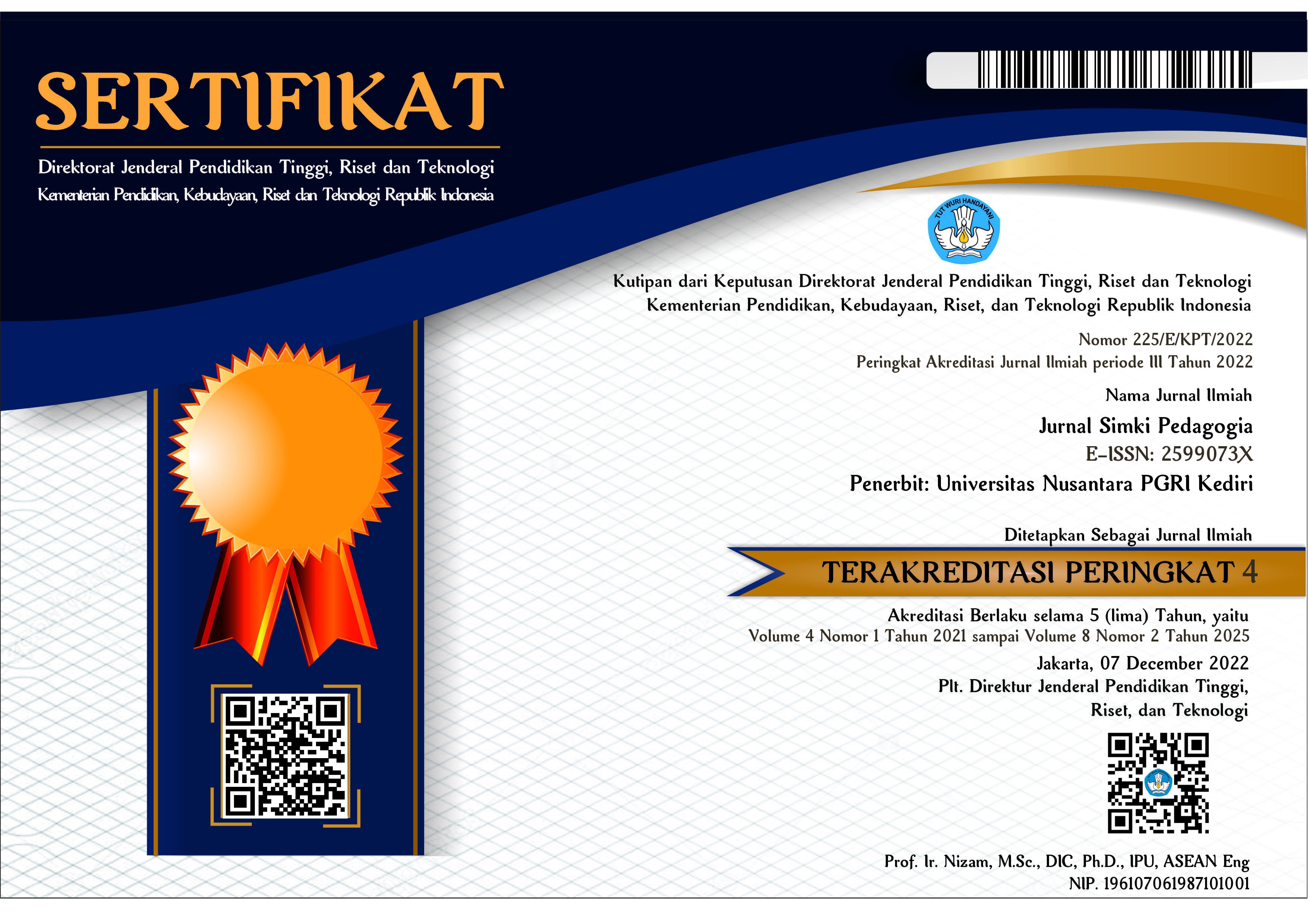Tingkat Pemahaman Mahasiswa Terhadap Pendidikan Karakter Di Jawa Timur Pada Era New Normal
 Abstract views: 466
,
Abstract views: 466
,
 PDF (Bahasa Indonesia) downloads: 299
PDF (Bahasa Indonesia) downloads: 299
Abstract
The education system that adapts to the post-Covid-19 era is marked by the "new normal" era. On the other hand, the transition of character education in the family environment brings a new problem, namely the lack of concept of character education in the family environment. Finally, there is the urgency of academic moral degradation in the millennial generation. Therefore, education is required to transform to provide strengthening character education in Indonesia. This study was conducted to determine students' understanding of character education and how students provide solutions to the threat of moral decline in the new normal era. This type of research is qualitative research. The sample selection used the accidental sampling method. With a sample of 24 from students in East Java. The data from this study were obtained from filling out questionnaires using Google Forms and distributing information through posters on Instagram. In this study, it was found that students already understood the importance of character education and could provide ways or solutions to shape character in the new normal era.
Downloads
References
Adhanom, Tedros. (2020). WHO Director-General's opening remarks at the media briefing on COVID-19 - 11 March 2020 [Speech transcript]. World Health Organization. https://www.who.int/director-general/speeches/detail/who-director-general-s-opening-remarks-at-the-media-briefing-on-covid-19---11-march-2020.
Agboola, A., & Tsai, K. C. (2012). Bring Character Education into Classroom. European journal of educational research, 1(2), 163-170. https://doi.org/10.12973/eu-jer.1.2.163
Andayani, D. & D. Darmawan. (2004). Pembelajaran dan Pengajaran. IntiPresindo Pustaka, Bandung.
Arum, Setya. (2009). Pendidikan Dasar dan Perkembangannya, Spektrum Nusa Press, Jakarta
Ashley, G. C., & Reiter-Palmon, R. (2012). Self-awareness and the evolution of leaders: The need for a better measure of self-awareness. Journal of Behavioral and Applied Management, 14(1), 2-17.
Benninga, J. S., M. W. Berkowitz, P. Kuehn, and K. Smith. 2003. “The Relationship of Character Education Implementation and Academic Achievement in Elementary Schools.” Journal of Research in Character Education 1 (1): 19–32.
Darmawan, D. (2015). Metodologi Penelitian. Metromedia, Surabaya.
Darmawan, D. (2019). Bahasa Indonesia : Pengantar Penulisan Karya Ilmiah, Metromedia, Surabaya.
Dictionary.com. (n.d.). New Normal. https://www.dictionary.com/browse/new-normal
Etikan, I., Musa, S. A., & Alkassim, R. S. (2016). Comparison of convenience sampling and purposive sampling. American journal of theoretical and applied statistics, 5(1), 1-4.
Josephson, M. S., & Hanson, W. (2002). Making ethical decisions. Marina del Rey, CA: Josephson Institute of ethics.
Josefsson, K., Jokela, M., Hintsanen, M., Cloninger, C. R., Pulkki-Råback, L., Merjonen, P., ... & Keltikangas-Järvinen, L. (2013). Parental care-giving and home environment predicting offspring's temperament and character traits after 18 years. Psychiatry Research, 209(3), 643-651. https://doi.org/10.1016/j.psychres.2013.01.007
Karina, A., T. Baskoro K. & D. Darmawan. (2012). Pengantar Psikologi. Addar Press, Jakarta.
Lubis, R. R. (2020). Historisitas Dan Dinamika Pendidikan Karakter Di Indonesia. 1. 70-82.
Mardikaningsih, R. (2014). Metode Pembelajaran dan Variasi Penerapannya, Jurnal Ilmiah Manajemen Pendidikan Indonesia, 1(1), 43-54.
Morin, A. (2011). Self‐awareness part 2: Neuroanatomy and importance of inner speech. Social and Personality Psychology Compass, 5(12), 1004-1017.
Moser A, Korstjens I. Series: Practical guidance to qualitative research. Part 1: Introduction. The European Journal of General Practice. 2017 Dec;23(1):271-273. DOI: 10.1080/13814788.2017.1375093. PMID: 29185831.
Muslikhin, M. (2019). Nilai-Nilai Pendidikan Karakter Dalam Pembelajaran Pendidikan Agama Islam. Al-Bahtsu: Jurnal Penelitian Pendidikan Islam, 4(1).
Pala, A. (2011). The Need For Character Education . International Journal of Social Sciences and Humanity Studies , 3 (2) , 23-32 . Retrieved from https://dergipark.org.tr/en/pub/ijsshs/issue/26222/276136
Park, N., and C. Peterson. 2006. “Moral Competence and Character Strengths among Adolescents: The Development and Validation of the Values in Action Inventory of Strengths for Youth.” Journal of Adolescence 29 (6): 891–909
Rahmandani, F., Tinus, A., & Ibrahim, M. M. (2018). Analisis dampak penggunaan gadget (smartphone) terhadap kepribadian dan karakter (kekar) peserta didik di SMA Negeri 9 malang. Jurnal Civic Hukum, 3(1), 18-44. https://doi.org/10.22219/jch.v3i1.7726 .
Saroinsong, Benny & E. A. Sinambela. (2014). Uji Beda Hasil Belajar Siswa melalui Metode Pembelajaran Ceramah dan Metode Pembelajaran Simulasi, Jurnal Ilmiah Manajemen Pendidikan Indonesia, 1(1), 33-42.
Sinambela, E. A. (2014). Motivasi Belajar dan Disiplin Belajar serta Pengaruhnya terhadap Hasil Hasil Belajar Siswa. Jurnal Ilmu Pendidikan, 8(2), 91-104.
Syarbini, A. (2014). Model Pendidikan Karakter Dalam Keluarga. Elex Media Komputindo.
Weber, M., and W. Ruch. 2012. “The Role of a Good Character in 12-year-old School Children: Do Character Strengths Matter in the Classroom?” Child Indicators Research 5 (2): 317–334.
Copyright (c) 2022 Rafadi Khan Khayru, Sudja’i

This work is licensed under a Creative Commons Attribution 4.0 International License.

Jurnal Simki Pedagogia : https://jiped.org/index.php/JSP/index is licensed under a Creative Commons Attribution 4.0 International License.
















